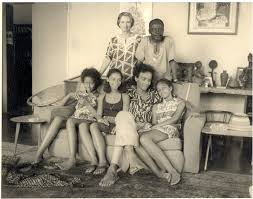“I am human: I think nothing human alien to me”

Terence the African
So wrote Terence the African, around 2000 years ago. He was a slave from Roman Africa, a dramatist, and an interpreter. He was quoted recently in the annual BBC Radio 4 Reith lectures, by Professor Kwame Anthony Appiah, professor of philosophy and law at New York University.

Appiah Now
Professor Appiah’s subject, “Mistaken Identities”, is one of the most defining issues of our age. We all have multiple identities which describe who we are. These include those suggested by our gender, age, occupation, political affiliation, nationality, race etc. The possibilities are endless when you think about it: parent, child, sibling, friend, Bake-off fan, or Queen of the South fan are just a few.
In a healthcare setting, we also have many identities, including being part of our own discipline, team, ward or service. Sometimes we are ourselves patients, and some of us are managers. Any health condition, whether physical or mental, can become part of our identity.
Appiah himself embodies many complex aspects of identity. Half-British, half-Ghanaian, he was brought up in Ghana and England, and has now adopted America as his homeland. He is the grandson of the Chancellor of the Exchequer, Sir Stafford Cripps. He is a crime novelist, and a fan of Japanese haiku. In addition, he was one of the first people to take advantage of the new gay marriage laws in New York State. He is probably ideally placed to set about unpicking assumptions which we all have about the “labels” associated with identity.

Growing up in England
Appiah discusses 4 aspects of identity over 4 lectures: creed [religion], country [nationality], colour [race] and culture [Western identity vs non-Western]. These are delivered in 4 different locations: London, Glasgow, Accra [capital of Ghana] and New York. The lectures cover the great sweep of history, and examples from a range of countries across the globe. They argue that identities are more complex and fluid, than are commonly supposed. They are more a “narrative”, than an “essence”, and do not necessarily determine who we are. Everywhere you look, you can find exceptions in identities, which challenge our commonly-held assumptions about them.

Growing up in Ghana
Identity is important for our survival. It helps give meaning to our lives, and helps us feel, and be, part of a community. Evolutionary psychologists would argue that it has been critical to our development as a species. All identities are constructed and evolve over time, but as soon as you construct an identity, you create potentially not only an “us” [those within the group], but also an “other” [those outside it]. When there is competition for resources, things can turn nasty, and the “others” may be persecuted or scapegoated. So it is important that we are relaxed and open about our identities, and that we recognise why that process of “othering” arises so easily within all of us. It’s a trap that is easy to fall into, and we need to resist it.
Appiah doesn’t mention healthcare in particular. But if we apply these ideas to the healthcare setting, we can see that a shared identity can help us pull together to meet our patient’s needs, in what are often increasingly challenging circumstances. Equally, there can be a process of “othering” which operates, whether it is towards our patients, our managers, our employees, or other agencies. Whilst understandable, “othering” can prevent us fully engaging with the “other” in a way that leads to the best outcome for all of us. This is relevant to our aims to provide person-centred care, and to integration with other agencies.
On the question of nationhood, Appiah isn’t against nationalism, so long as it is an “open, civic nationalism”. His favourite idea of nationhood, however, involves 2 concepts. The first is patriotism, defined as concern with the honour of your country [or countries]. This means feeling proud when your country does something good, and ashamed when it does something bad. The second concept is cosmopolitanism, which means being a citizen of the world. These can combine to form a “patriotic cosmopolitanism”. You can, and should, respect both “the local” and “the global”.
Identities connect the small scale, where we live our lives alongside our kith and kin [and healthcare colleagues], with larger movements, causes and concerns. Our lives must make sense at the largest of scales as well as at the smallest. We live in an era where our actions, both ideological and technological, have global effects. When it comes to the compass of our concern and compassion, humanity itself is not too broad a horizon. We live with 7 billion other humans, on a small, warming planet. The concept of cosmopolitanism has become a necessity.

Appiah with Obama
Appiah argues for a tolerant, pluralistic, and diverse society. He says, failure to accept this is not just a failure to understand human identity, it is not in our collective self-interest. We do not need to abandon identities, but we don’t need to be divided by them either. Ultimately, the identity of “being human” ought to transcend all others.
As Scout, the young heroine in the novel about race and mental illness, To Kill a Mocking Bird, concludes: “I think there’s just one kind of folks. Folks”.
The Reith lectures are available to listen to on the Radio 4 website, indefinitely.
Dr Dawn Renfrew is a Consultant Child and Adolescent Psychiatrist for NHS Dumfries and Galloway
















